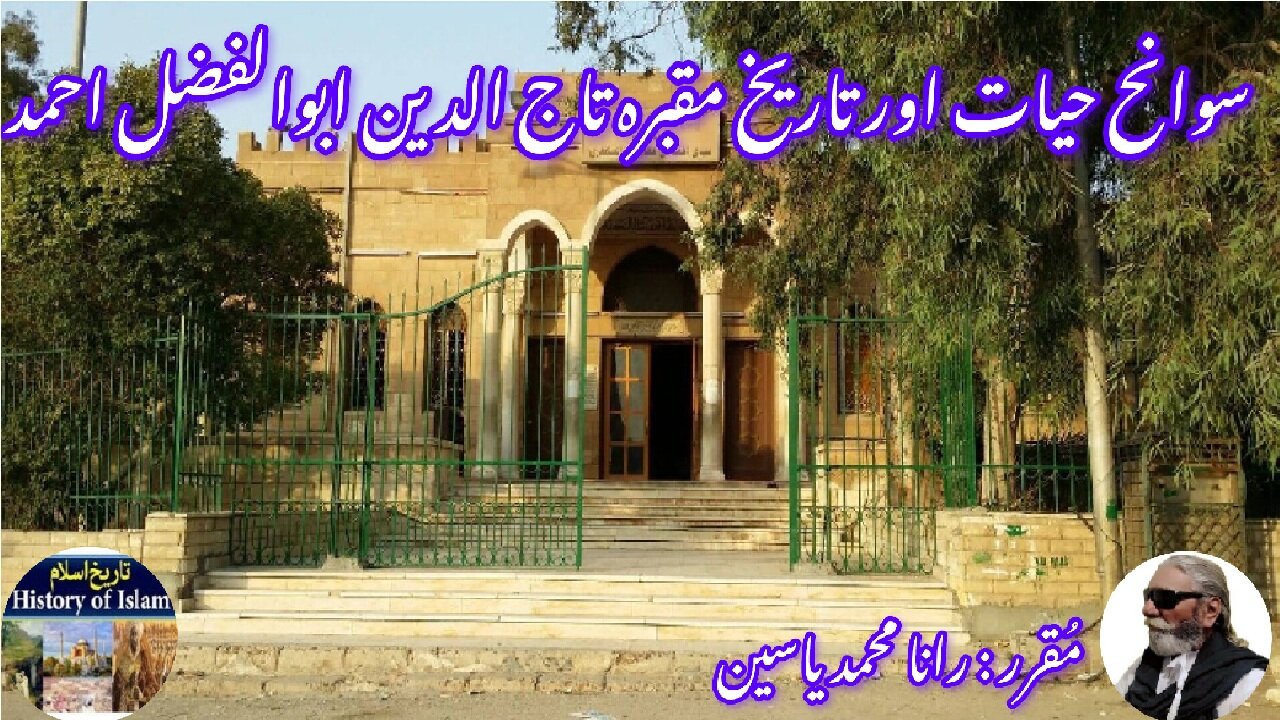Premium Only Content

Taj ad-Din Abu’l-Fadl Ahmad | ताज उद्-दीन | تاج الدین ابو الفضل احمد کی سوانح عمری اور مزار کی تاریخ
@islamichistory813 #sufisaint #culturalheritage #biography #islamicmysticism #islamicphilosophy #shrine #historicalfigures
Biography of Taj ad-Din Abu’l-Fadl Ahmad and the history of his shrine
Dekhti Aankhooon aur sountay kaanoon ko Asslamoalaikum, sisters, brothers friends and elders, in informative series videos of Islamic ascolars, sufisaints, cultural heritages, islamic philosophys, islamic mysticisms and historical figures. today we are describing biography of Taj ad-Din Abu’l-Fadl Ahmad and the history of his shrine.
Taj ad-Din Abu’l-Fadl Ahmad b.Muhammad b. Abd al-Karim b. Ata’illah as Sakandari, al-Judhami ash-Shadhili, known simply as Ibn Ata’illah as-Sakandari, was born in Alexandria, Egypt, as his family tree (nisbah) indicates, about the middle of the seventh [AH] /thirteenth [CE] century. His family were renowned Maliki scholars from the Banu Judham tribe, originally from Arabia. His grandfather, Abd al-Karim had distinguished himself as an expert in Fiqh, usul (principles of jurisprudence), and Arabic, having studied under the famous Abu’l-Hasan al-Abyari. He had written several books, among which were al-Bayin wa’t-Taqrib fi Sharh at-Tahdhib, Mukhtasar at-Tahdhib, and Mukhtasar al-Mufassal, and had been very hostile to Sufism.
On the other hand, Ibn Ata'illah' s father Muhammad (death date unknown) seems to have been of a different mind and although a Faqih (scholar), he was also the disciple of the great Sufi Shaykh Abu’l-Hasan ash-Shadhili, the founder of the Shadhili Sufi order.
As a youth, Ibn Ata'illah received a traditional Islamic education in such disciplines as Qur’anic recitation, Hadith (Prophetic tradition) , Tafsir (Qur’anic commentary), grammar, usul, philosophy, belles-lettres, and Fiqh (jurisprudence) under some of the best and most illustrious teachers of Alexandria, in addition no doubt, to the instruction given him by his own family.
Ironically, in spite of his father’s attachment to the Shadhili master Abu’l-Hasan, Ibn Ata'illah was initially rather hostile to Sufism much like his grandfather, as he himself admits in his book Lata’if al-Minan, but not for any definite reason. In fact, what precipitated his meeting with Shaykh Abu’l-Abbas al-Mursi, the successor of Shaykh Abu’l-Hasan was an argument with one of al-Mursi’s disciples. Consequently, Ibn Ata'illah decided to see for himself who this man was after all, ‘a man of Truth has certain signs that cannot be hidden’. He found him holding forth on such lofty spiritual matters that he was dazzled. Ibn Ata'illah states that at that moment GOD removed whatever objections he previously had. Something had obviously touched his heart and mind, so he went home to be alone and reflect.
That was apparently the turning point for him, for shortly thereafter Ibn Ata'illah returned to visit Shaykh Abu’l-Abbas al-Mursi who received him so warmly that he was embarrassed and humbled. Ibn Ata'illah states, ‘The first thing that I said to him was “O Master, by GOD, I love you”. Then he answered, “May GOD love you as you love me”. Then Ibn Ata’illah told him of various worries and sadness he had, so the Shaykh told him: There are four states of the servant, not five: blessings, trials, obedience, and disobedience. If you are blessed, then what GOD requires of you is thankfulness. If you are tried, then what GOD requires of you is patience. If you are obedient, then what GOD requires of you is the witnessing of His blessings upon you. If you are disobedient, then what GOD requires of you is asking forgiveness.
After leaving Shaykh al-Mursi, he mentions that he felt that his worries and his sadness were like a garment that had been removed. From that time in 674 AH/ 1276 AD when Ibn Ata'illah was initiated into the Shadhili order until the death of Shaykh al-Mursi twelve years later, he became his devoted disciple and says that in all those years he never heard his Shaykh say anything that contradicted the Shari'a.
What spiritual fruits he must have received cannot be known, but his development into a Sufi master capable of guiding and teaching others took place within the lifetime of his Shaykh, i.e., well within e twelve-year period before 686 AH/1288 AD. His discipline and progress in the path coupled with his great learning made him renowned as a religious authority.
Ibn Ata'illah’s virtue, majestic presence, eloquence, and spiritual insights were such that he had many followers. He even performed miracles, some of which have been recorded, such as speaking from his grave to one Kamal ad-Din b. al-Hamam who had gone to the Shaykh's tomb to recite Surat Hud. As a result, Ibn al-Hamam was counselled to be buried there. Another miracle attributed to Shaykh Ibn Ata'illah is his having been seen in Mecca at three different places by one of his disciples who had gone on Pilgrimage. When the latter returned, he asked if the Shaykh had left the country in his absence and was told no. Then he went to see him and Ibn Ata'illah asked him, ‘Whom did you see on this trip of yours?’ The disciple answered, ‘O Master, I saw you’. So he smiled and said, ‘The realized sage fills the universe. If he summoned the Qutb (Spiritual Pole), verily he would answer.’
Still another miracle recorded is the story of three men on their way to attend Shaykh Ibn Ata'illah’s public lecture (majlis). One said, ‘If I were free from the family, I would become an ascetic’; the second one said, ‘I pray and fast but I do not see a speck of benefit’; and the third said, ‘Indeed, my prayers do not please me so how can they please my Lord?’ After arriving, they heard Ibn Ata'illah discourse and in their presence he said, ‘There are among people those who say…’ and he repeated their words exactly.
Ibn Ata'illah taught at both the al-Azhar Mosque and the Mansuriyyah Madrasah in Cairo as well as privately to his disciples. However, it is not known where his Zawiyah was located.
Shaykh Ibn ‘Ata’ Allah died at around sixty years of age in the middle of Jumada II 709 AH/November 1309 AD. As befitting an eminent and learned teacher, he died in the Mansuriyyah Madrasah. His funeral procession was witnessed by hundreds of people and he was buried in the Qarafah Cemetery in Cairo in what is today called the City of the Dead, at the foot of Jabal al-Muqattam. His tomb became famous as the site of homage, visitation, prayer, and miraculous occurrences. To this day this is still the case.
This pious and extraordinary contemplative figure left behind a spiritual legacy no less impressive than those of his own beloved Shaykh, and the eminent founder Shaykh Abu’l-Hasan ash-Shadhili. All the biographers refer to Ibn ‘Ata’ Allah with illustrious titles and reverence and mention how marvellously he spoke and how uplifting his words were. In spite of the fact that he followed the Maliki madhbab, the Shafi’is laid claim to him, most probably because some of his earlier teachers had been Shafi’i scholars, not to mention some of his students.
Hence, his disciples could only be all the more devoted in their attachment to and love for him. Of the untold numbers of followers that Shaykh Ibn Ata’ Allah had, both in Cairo, Alexandria, and elsewhere, only very few names are known. That is, doubtless, due to the fact that the Shadhilis did not advocate withdrawing from the world or wearing special clothing to distinguish themselves. They were ‘in the world but not of the world’, so to speak.
He Died in 709 AH / 1310 CE Era Medieval Region Alexandria, and buried in ‘Qarafa al Kubra’ in old Cairo near Maqam of Ibn Ataullah Al Iskendary. There is a well known incident on Shaikh Kamal. He was a constant visitor at Maqam of Ibn Ataullah AlIskendary. One day while he was reciting ‘Surah Al Hud’ at vicinity of the Maqam and when he reached the verse 105 ( The day it arrives, no soul shall speak except by his leave: of those (gathered) some will be wretched and some will be blessed) a voice in high tone came from Qabr of Ibn Ata (RA) saying that (Oh Kamal, there is no wretched among us)
With this, we seek your permission until tomorrow, tomorrow we will describe the biography of Imam Ali-ul-Haq and the history of his maqbara. Allah Hafiz.
=========================
-
 40:43
40:43
Kimberly Guilfoyle
8 hours agoDems Double Down on Delusion-Why? Live with Tony Kinnett & Bo French | Ep.202
77.8K35 -
 1:28:42
1:28:42
Redacted News
6 hours agoBREAKING! SOMETHING BIG IS HAPPENING IN EUROPE ALL OUT WAR IS COMING AGAINST RUSSIA, TRUMP FURIOUS
121K288 -
 47:50
47:50
Candace Show Podcast
7 hours agoBREAKING: Judge Makes Statement Regarding Taylor Swift's Text Messages. | Candace Ep 155
113K119 -
 1:14:23
1:14:23
Josh Pate's College Football Show
4 hours ago $0.32 earnedCFB’s Most Hated Teams | FSU & Clemson Future | Big Ten Win Totals | Star Rankings Overrated?
14.5K -
 1:33:47
1:33:47
CatfishedOnline
5 hours agoGoing Live With Robert - Weekly Recap
27.8K -
 55:18
55:18
LFA TV
1 day agoEurope’s Sudden Turn Against America | TRUMPET DAILY 3.6.25 7PM
32.2K3 -
 4:21
4:21
Tundra Tactical
5 hours ago $2.12 earnedPam Bondi MUST Enforce Due Process NOW!
23.7K1 -
 56:42
56:42
VSiNLive
6 hours agoFollow the Money with Mitch Moss & Pauly Howard | Hour 1
48K1 -
 1:05:32
1:05:32
In The Litter Box w/ Jewels & Catturd
1 day agoShalom Hamas | In the Litter Box w/ Jewels & Catturd – Ep. 756 – 3/6/2025
103K37 -
 1:23:00
1:23:00
Sean Unpaved
8 hours ago $0.56 earnedNFL Free Agency
53.4K4